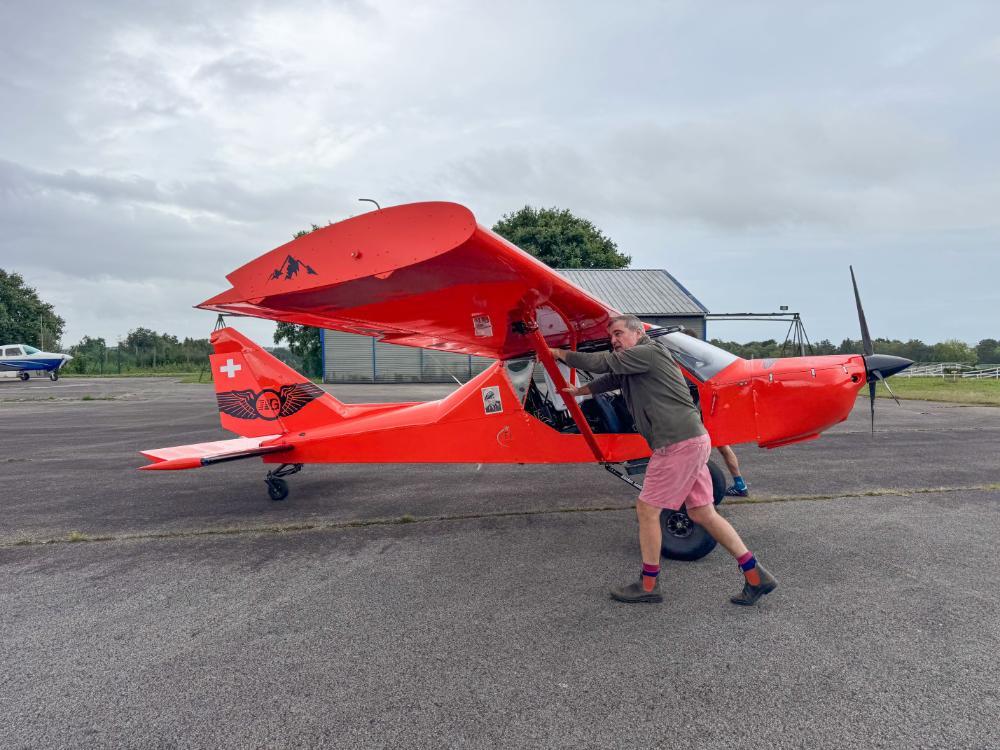
From the high notes of Henley to the thrills of an elite French cycle race, a collaborative project involving the University of Strathclyde is pushing the boundaries of live broadcast using airborne private 5G networks.
A series of three proof-of-concept trials have demonstrated how private 5G connectivity – deployed from aircraft and drones – can enable more immersive, flexible, and reliable wireless connectivity for major sporting and cultural events.
Live footage
At the Bretagne Classic cycle race in France this August, live footage was transmitted from motorbike-mounted cameras along the challenging, hilly route to an ultralight aircraft equipped with private 5G technology developed by Neutral Wireless, a spin-out from Strathclyde. The video feeds were then received by a mobile ground station and uploaded to the cloud using Low-Earth Order (LEO) satellite technology.
 The feeds were also uploaded directly to the cloud from the specially adapted aircraft – complete with folding wings - using bonded technology on the Orange public network. Professional audio captured was also delivered over the private network to enhance the immersive experience.
The feeds were also uploaded directly to the cloud from the specially adapted aircraft – complete with folding wings - using bonded technology on the Orange public network. Professional audio captured was also delivered over the private network to enhance the immersive experience.
In July, the UK’s only black-tie music and arts event – Henley Music Festival – became the first of its kind to use a dedicated private 5G network for video production. Remote roving cameras recorded authentic crowd reactions from the 27,000 attendees and performances on the banks of the Thames.
Tethered drone
The same month in Turin, Italy, a tethered drone carrying a lightweight radio head created an airborne 5G cell for video testing. The system streamed multiple high-definition video feeds to ground infrastructure, demonstrating strong performance and range.
The trials aim to support broadcasters in producing more content at lower cost, while enhancing audience engagement and contributing to greener, safer live production methods. The project was led by Strathclyde, Neutral Wireless and Canadian video networking company Haivision and supported through the IBC Accelerator Media Innovation Programme.
Professor Bob Stewart, head of the University of Strathclyde’s Software-defined Radio team, said:
As a founding Champion of this groundbreaking Accelerator project, we are proud to have been involved in all three proof-of-concept trials, which deployed innovative private 5G networks to support uplink-biased broadcast workflows in challenging environments.
"Our potentially game changing technology, which has its origins in the software-defined radio labs at the University of Strathclyde, has also been used at world-leading broadcasts, such as the Coronation of King Charles III in London in 2023 through to a number of locations and venues across land and sea in Paris and Marseille last summer.”
Technology challenges
Mark Smith, IBC Accelerator Founder, Lead and IBC Council Chair, said: “The IBC Accelerator Programme provides a collaborative environment for industry leaders to fast-track real-world solutions to pressing media technology challenges.
“France Télévisions and the project Champions and Participants in the ‘Conquering the Air(waves)’ Private 5G focused project have really pushed the envelope for the future of live remote production for broadcasters.”
Project partners included Adapt Media Services, BBC, D&B Solutions, EBU, Eutelsat, Globo, Haivision, Neutral Wireless, Open Broadcast Systems, Orange Events, QTV, RAI Radiotelevisione Italiana, RTÉ, France Télévisions and Shure.